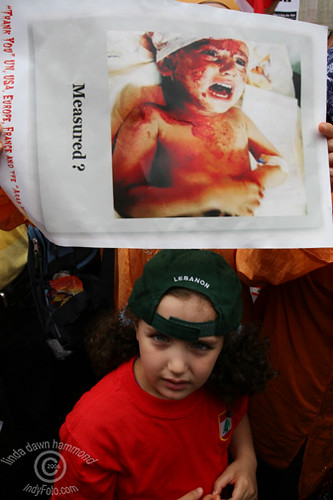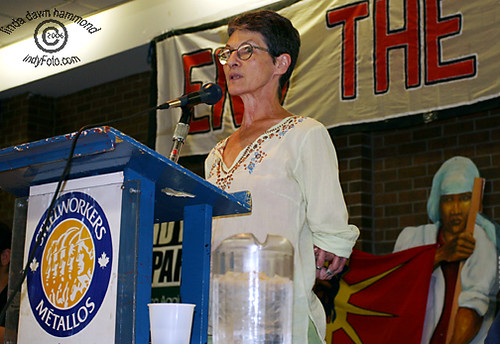STOP the ATTACK on Lebanon! Articles 2 -Palestinians in Lebanon,Lebanese flee,Israel's Arabs
http://www.flickr.com/photos/56709485@N00/sets/72157594208421837/
STOP WAR INDYFOTO Set
ARTICLES FOLLOW
http://mondediplo.com/2006/07/03refugees
Middle East in crisis
Lebanon: the other Palestinians
As the world focuses its attention on the grave crisis in Lebanon and Gaza (see “A long week in Gaza City”), which risks being transformed into a regional conflict, it is time to listen to the Palestinians in Lebanon - in particular those still living in the refugee camps.
By Marina Da Silva
The current crisis in Lebanon has revived the debate about disarming Hizbullah and returned attention to the Palestinians, who mostly live in Lebanon’s refugee camps, forgotten by history and left out of negotiations. Now they are being pushed to the centre of the political stage and are trying to assert a right of return which they have never renounced.
Khadda, who lived in the biggest camp in Lebanon, Ein al-Hilweh, on the edge of Saida, so dreaded the tensions and armed conflicts in it that she left the camp, risking the cohesion of her family. Her husband, who runs a small shop, has stayed, and her children go back every weekend. She said: “The refugee camps, and Ein al-Hilweh in particular, are always described in the national and international press as no-go areas that harbour criminals and Islamic extremists. But we are the camp, more than 45,000 of us, and we cherish our identity and our history. It’s not those tearaways, at most a couple of hundred, who are the products of insecurity and political stalemate.” Even more than the violence, Khadda is weary of the sense of suffocation, of the poverty clearly visible in the narrow, filthy streets and crumbling houses, fertile ground for Islamic radicalisation.
The turning point came in 1982 with Israel’s invasion and the forced departure of the Palestine Liberation Organisation (PLO) and its fighters. The PLO had provided work for nearly 65% of the Palestinians, as well as funding for health and education (also open to destitute Lebanese). Lebanon’s Palestinians then felt forgotten by the Oslo agreements of 1993: the PLO concentrated its diplomatic efforts on the West Bank and Gaza, which also received international aid. The budgets allocated to Lebanon by international NGOs, Unrwa (1) and other UN agencies were drastically reduced. The refugee camps that bore the brunt of war and economic hardship have been passed over.
The Islamist movements, mainly Islamic Jihad and the Islamic Resistance Movement (Hamas), have touched the poorest sections of the population by providing much-needed aid. Hamas benefited from popular anger after Israel deported 415 Palestinians close to the movement from the occupied territories to southern Lebanon in December 1992; Hamas benefited again when Israel began targeted assassinations of Palestinian Islamist political leaders: Sheikh Ahmad Yassin in March 2004 and Abdelaziz al-Rantissi a month later, both in Gaza. Their portraits are everywhere. Hamas’s victory in the Palestinian elections in January has added to its strength.
Um Fadi, who is close to the Popular Front for the Liberation of Palestine, was surprised “like everyone else” at the Hamas victory, but she was pleased with the result, a vote “against corruption and for Palestinian rights, including the right of return”. Ein al-Hilweh is not like it was when her children were born there: in those days the camps were the symbol of Palestinian political life and of building a society in exile. “Today,” she said, “the population is hostage to political factions settling internal scores. Often there are deaths and people are afraid. But they don’t want to leave, because the camp still symbolises our long wait for return and the struggle for our rights.”
On 1 May a member of Fatah was killed by a militant member of Usbat al-Ansar (League of Partisans), a Salafist group thought to have links with al-Qaida. The death was the latest in a long list of casualties. These confrontations, political as much as criminal, often go beyond internal rivalries: they are part of a strategy of tension orchestrated by the various organisations’ secret services and meant to confuse. Ein al-Hilweh retains its symbolic status as a political camp where all Palestinian parties are recognised and respected, a real capital of the Palestinians in exile.
Sensitive situation
“The situation is sensitive,” said Abu Ali Hassan, a former leader of Ein al-Hilweh who is now at Mar Elias, a small, mainly Christian camp in Beirut, where he is in charge of relations with the Lebanese political parties. “The disarmament of the Palestinian organisations, called for by resolution 1559 of September 2004, at the instigation of France and the United States, constitutes one of the issues in Lebanese political life (2). The national unity government in Beirut has formed a committee to negotiate the disarmament of the bases outside the camps and control the arms inside them. We’re working towards creating a united delegation and ensuring that this issue isn’t dealt with just from a security point of view, but that the outcome will advance our political rights and improve the humanitarian situation in the camps.”
Abbas Zaki, from Fatah, heads the PLO representation in Jnah, in the southern suburbs of Beirut. He believes that its reopening in May was a strong political signal: “The government doesn’t want to deal with this issue by force; it’s mainly armed Palestinians in a dozen bases spread out across the Beqaa valley and in the coastal town of Nahme, 15km south of Beirut, who cause problems.” The statement by Mahmoud Abbas, president of the Palestinian Authority, in Paris last October, that Palestinians living in Lebanon had to “obey the law” and that they were there as “guests” was not welcomed.
Lebanese newspapers regularly report infiltrations of Palestinian militants from Syria into the western Beqaa, which have led the Lebanese army to seal off some 40 illegal crossing points between the countries and to tighten its control of Palestinian factions that are linked to pro-Syrian organisations based in Damascus, such as the PFLP-GC, Fatah-Intifada (a splinter group of Fatah, led by Abu Musa) and Al-Saiqa (the Palestinian wing of the ruling Ba’ath party in Syria).
“Because we’ve led the armed resistance to Israel and are still active and influential, we’re seen as obstacles to peace”, said Nabil, who heads the people’s committee in the camp at Beddawi, below Tripoli, in the north. Beddawi has less crowded houses, rebuilt roads and sewers, and is further away from the battle zone. It might seem peaceful, but to Nabil ,war remains a threat: “Israeli planes still fly regularly over Lebanon, north to south and back again, with total impunity. Sabra and Shatila will remain forever in our memory. We were massacred while we were under the protection of international forces. The arms in the camps are there to ensure our protection” (3).
The arms question conceals the Palestinians’ living conditions and their banishment. According to Unrwa’s March figures, there are 404,000 Palestinian refugees in Lebanon, of whom 220,000 live in a dozen camps around the country. These include: in Beirut, Mar Elias, Burj al-Barajneh, Sabra and Shatila, and Dbayeh; in the south, near Saida, Ein al-Hilweh and Mieh Mieh; also in the south, near Tyre, al-Buss, Rashidieh, Burj al-Shemali; in the north by Tripoli, Nahr al-Bared and Beddawi; and Wavel in the Beqaa valley. There are also small illegal ghetto-camps, not recognised by Unrwa and therefore without aid.
The Lebanese army keeps up pressure around the camps, particularly those in the south which provide shelter for some 100,000 refugees; access to these is restricted and requires a permit.
Fatah remains the most powerful organisation here, while in the camps in Beirut, northern Lebanon and the Beqaa, the pro-Syrians have maintained a significant presence. Everywhere the increasing strength of the Islamist movements is noticeable: some think it now puts Fatah and Hamas on an equal footing.
According to Unrwa, 60% of Palestinian refugees live in poverty and as many as 70% are unemployed. Until recently there were 72 jobs they were unable to practise outside the camps; they were not allowed to bring construction material into the camps; and they cannot leave or re-enter Lebanese territory without a visa, which lasts for only six months.
In June 2005 the Lebanese minister of labour, Trad Hamade, who is close to Hizbullah, signed a memorandum in favour of Palestinians born in Lebanon and registered at the interior ministry, which partly lifts the ban on doing certain jobs. But this does not change anything for qualified Palestinians, who still cannot practise medicine, law or architecture. There is total silence about a 2001 law that forbade Palestinians to buy houses or property in Lebanon, which has led to legal confusion, particularly on inheritance.
Samira Salah heads the PLO’s department for Palestinian refugee affairs and coordinates the campaign for the rights of refugees in Lebanon and the right of return, in accordance with UN resolution 194. She sees Hamade’s measures as a step forward, though they will not change anything in real terms: “Proposals were already made in 1995 indicating that a Palestinian born in Lebanon had the right to work, on condition he had a permit; but this permit is still almost impossible to obtain and the minister’s proposal doesn’t include social security or insurance.”
The campaign for Palestinian rights was started in April 2005 by a collective that brings together 25 Palestinian associations, the Palestine National Council, the PLO’s refugee affairs department and members of civil society. The campaign includes workshops and training, and seeks to gain the support of the Lebanese population to create a broad movement of political pressure. Under the slogan “Civil rights until we return; together with the Lebanese we will resist settlement and naturalisation of refugees”, the campaign has four main demands: the right to work, to own property, to security and to free association. These are not new but they have never been answered.
There are now some 4 million refugees, about 60% of the Palestinian community, who were originally forced into exile in their hundreds of thousands when the state of Israel was created; 90% live in the Palestinian territories and neighbouring Arab countries. Lebanon’s Palestinians crystallise the most sensitive issues in both Lebanese and regional politics. They are a reminder that any move in the Arab-Israeli conflict is linked to a resolution of the refugee problem.
http://news.independent.co.uk/world/middle_east/article1183355.ece
18 July 2006 13:40
Home > News > World > Middle East
Thousands of Lebanese flee to Beirut from unstable south
By Jerome Taylor
Published: 18 July 2006
As foreign powers mobilised to evacuate their citizens, tens of thousands of Lebanese civilians were fleeing the country's southern areas last night, following six days of near-continual bombardment by Israeli artillery and air power.
Officials said more than 58,000 people had been displaced by the fighting and 14,000 have headed to the relative safety of Beirut, despite the fact that Lebanon's capital has been attacked every day since Thursday.
Thousands of people from Beirut's southern Shia suburbs, a stronghold of Hizbollah and a major target for Israeli bombing raids, have also fled into the city centre to avoid the daily air strikes that have killed an average of 33 Lebanese civilians a day.
Speaking from the cramped and increasingly squalid Sanayeh Gardens - one of Beirut's oldest parks, used as a refugee camp during the 1982 Israeli invasion of Lebanon - Ali Sharara, 21, said, "My brother and I have been here more than two days. My mother and sisters are in Ashrafieh, I don't know where exactly. I can't believe they [the Israelis] are doing all this for two captives. This is just an excuse."
Another refugee, Hussein Ajami, said: "We've been sleeping outside on the grass. They keep telling us about schools that have opened their doors, but when we get there we find them already full."
The reappearance of so many refugees in Lebanon is a stark and depressing reminder of the country's 15-year civil war which killed more than 100,000 people and created a refugee crisis. Many of the sites that once housed refugees from the civil war and Israel's previous invasion of Lebanon are fast filling up again.
There are also fears that the arrival of so many refugees may upset Beirut's delicate sectarian balance. Most of the new arrivals are Shia Muslims who are having to find shelter and support in Beirut's Sunni and Christian areas.
The government's struggling Interior Ministry began trying to set up gathering points where families and refugees could try and find shelter. Hizbollah supporters were also out in force organising refugee centres.
As foreign powers mobilised to evacuate their citizens, tens of thousands of Lebanese civilians were fleeing the country's southern areas last night, following six days of near-continual bombardment by Israeli artillery and air power.
Officials said more than 58,000 people had been displaced by the fighting and 14,000 have headed to the relative safety of Beirut, despite the fact that Lebanon's capital has been attacked every day since Thursday.
Thousands of people from Beirut's southern Shia suburbs, a stronghold of Hizbollah and a major target for Israeli bombing raids, have also fled into the city centre to avoid the daily air strikes that have killed an average of 33 Lebanese civilians a day.
Speaking from the cramped and increasingly squalid Sanayeh Gardens - one of Beirut's oldest parks, used as a refugee camp during the 1982 Israeli invasion of Lebanon - Ali Sharara, 21, said, "My brother and I have been here more than two days. My mother and sisters are in Ashrafieh, I don't know where exactly. I can't believe they [the Israelis] are doing all this for two captives. This is just an excuse."
Another refugee, Hussein Ajami, said: "We've been sleeping outside on the grass. They keep telling us about schools that have opened their doors, but when we get there we find them already full."
The reappearance of so many refugees in Lebanon is a stark and depressing reminder of the country's 15-year civil war which killed more than 100,000 people and created a refugee crisis. Many of the sites that once housed refugees from the civil war and Israel's previous invasion of Lebanon are fast filling up again.
There are also fears that the arrival of so many refugees may upset Beirut's delicate sectarian balance. Most of the new arrivals are Shia Muslims who are having to find shelter and support in Beirut's Sunni and Christian areas.
The government's struggling Interior Ministry began trying to set up gathering points where families and refugees could try and find shelter. Hizbollah supporters were also out in force organising refugee centres.
http://news.independent.co.uk/world/middle_east/article1183353.ece
18 July 2006 13:42
Home > News > World > Middle East
Israel's Arab citizens caught in a war they never wanted
By Donald Macintyre in Majd el Krum
Published: 18 July 2006
Hassan Nasrullah, the leader of Hizbollah, has spoken of having more "surprises"in store for Israel after the deluge of rockets which culminated in the killing of eight Israeli civilians in Haifa in a single attack on Sunday.
But few residents of northern Israel can have been as "surprised" as those in the Arab village of Majd el Krum when it was hit by a volley of six Katyushas.
"We never saw anything like this," said Inas Ayub, 25. "There was no warning and we never expected anything like it."
Mrs Ayub lives next door to the fortunately empty house her brother-in-law Mahmoud is building for his son, part of whose roof and top floor was blown away by a direct hit from a Hizbollah rocket. She described how she was sitting inside her house with her two sons, one-year-old Mohammed and Liaan, three, when "I heard a very loud explosion. It was very strong. I took my sons downstairs. I started to scream because I saw that all the windows were broken and the front yard was full of rubble. Then I fainted."
This experience - though traumatic for the Ayub family - is trifling compared to the death and destruction in Lebanon they were seeing on their television screen yesterday. But it is especially vexing for the Muslim inhabitants here who, while reluctant to talk politics, mainly proclaim their neutrality in a war in which they have no part.
As the vulnerability of the village to a repeat of last Thursday's Katyusha attack was underlined by a volley of rockets on Karmiel three kilometres away, Mrs Ayub said that Hizbollah appeared not "to make a difference between Jews and Arabs. But we all eat from the same plate."
Najib Sjeer, 63, a former deputy superintendent of schools, echoed the frequent complaints about discrimination against Israel's Arab citizens by saying there were no warning sirens in the village and no shelters in the schools. While the village had not been caught up in a war since 1948, he added: "There are no public shelters. We have no protection.
"We are a part of Israel but Israel does not see us as part of the country," he said.
Mr Sjeer did not directly apportion blame for the war but declared: "Israel has planned to destroy Hizbollah for a long time and now they have found an excuse. This is not about the two soldiers who were kidnapped. Basically this is to destroy south Lebanon. If you shoot at a bus with 20 civilians you are not just going after Hizbollah."
Mr Sjeer insisted that the village would not be deterred from its normal life by the rocket volley. "Yesterday we had a big wedding here, and it would have been a disaster if there had been a rocket. But we have faith here. If it happens it won't be because of Nasrallah or Olmert or Peretz. Everything is from Allah."
Aslan Hammoud, 18, returned home yesterday from hospital having had three pieces of shrapnel removed from his shoulder after being wounded by a Katyusha which landed across the road from his family's home and pet shop. Part of the rocket was still embedded in the car park opposite the house. His father Mahmoud, 43, explained that as one of the relatively few residents to have built his house with an official permit, the family does have a secure room in the basement, but none of the family had been in it when the Katyusha landed without warning.
Mr Sjeer, like Mrs Ayub, said he did not believe that Hizbollah distinguished between Jewish and Arab villages. "They don't ask for people's ID cards before firing," he said. But Mahmoud Hammoud was convinced there was a reason why there had so far been no repeat of the Katyusha attack here. "This is a Muslim town and that is why I believe they have stopped shooting in this direction."
Maybe. But yesterday a Katyusha landed on Abu Snen, an Arab village seven miles away.
SPEAKER Naomi Binder Wall - Member, Jewish Women's Committee to End the Occupation. Monday July 17, 2006 Steelworkers Hall Toronto
Mass Rally/ Protest
- Sat. July 22, 06 1 PM
- Israeli Consulate, 180 Bloor St. West Toronto
(W. of Avenue Rd., N. of Bloor)
www.nowar.ca
This site contains copyrighted material the use of which has not always been
specifically authorized by the copyright owner. We are making such material available in our efforts
to advance understanding of environmental, political, human rights, economic, democracy, scientific,
and social justice issues, etc. We believe this constitutes a 'fair use' of any such copyrighted
material as provided for in section 107 of the US Copyright Law. In accordance with Title 17 U.S.C.
Section 107, the material on this site is distributed without profit to those who have expressed a
prior interest in receiving the included information for research and educational purposes. For more
information go to:
http://www.law.cornell.edu/uscode/17/107.shtml. If you wish to use copyrighted material from
this site for purposes of your own that go beyond 'fair use', you must obtain permission from the
copyright owner.








0 Comments:
Post a Comment
<< Home